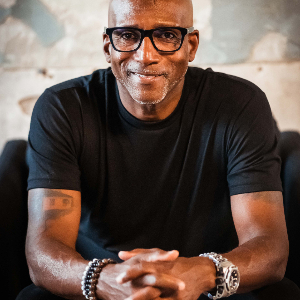Just Human: Rediscovering Our Shared Humanity

Everywhere we look today, we find reminders of what divides us—whether in politics, cultural differences, or social issues. It seems easier to focus on disparities rather than the things that unite us. While our differences are valuable and deserve recognition and respect, it is equally important to remember the common thread that binds us all: our shared humanity.
This idea of being “just human” is central to our personal growth and to fostering inclusive environments where everyone feels valued. In this blog post, we’ll explore how embracing our shared humanity can help us build empathy, form deeper connections, and promote an inclusive culture in both our personal lives and workplaces. Along the way, we'll learn valuable lessons from the hopeful vision of Star Trek and discuss practical strategies for breaking down barriers and finding common ground.
The Vision of Star Trek: A Blueprint for Unity
Let’s start with a little confession: I am a giant Trekkie. For those who may not be familiar, a “Trekkie” is a fan of Star Trek, a groundbreaking television series that first aired in the 1960s. This show didn’t just entertain—it challenged societal norms and broke new ground with its diverse cast and thought-provoking narratives. At its core, Star Trek offered a hopeful vision of the future, where humanity, despite its flaws and conflicts, could rise above differences to forge connections across the galaxy.
In the Star Trek universe, diversity is not just tolerated but celebrated. Each species—whether Vulcan, Klingon, or Human—brings unique strengths and perspectives to the table, contributing to a richer tapestry of life in the galaxy. Take the episode "Darmok" from Star Trek: The Next Generation as an example. In this episode, Captain Jean-Luc Picard and an alien captain, Dathon, are stranded on a planet where they must cooperate to survive, despite their inability to understand each other’s language. Through empathy and shared experience, they find common ground, highlighting how cooperation and mutual respect can overcome even the most profound communication barriers.
By emphasizing themes of empathy, cooperation, and mutual respect, Star Trek reminds us that diversity is a strength, not a weakness. This lesson is just as relevant today as we navigate a world filled with division. We can learn from Star Trek’s vision of unity by embracing our collective humanity and working together to build a more inclusive society.
Understanding the Concept of “Just Human”
So, what does it mean to be “just human?” At its essence, being "just human" is about recognizing that, despite our diverse backgrounds, identities, and beliefs, we all share a fundamental human experience. It’s about acknowledging that every person, regardless of who they are or where they come from, experiences joy, pain, love, loss, fear, and hope. These shared emotions and experiences form a common ground that connects us at a deeper level.
When we strip away the labels and divisions imposed by society, we find that we are all navigating similar journeys in life. Recognizing this common ground allows us to approach each other with empathy, understanding, and a genuine desire to connect.
Empathy is crucial in building meaningful connections. It enables us to see the world from another person’s perspective and to share in their feelings. For example, when we understand that everyone experiences grief at some point in their lives, we become more compassionate toward those who are grieving, regardless of their background or beliefs. This shared understanding helps break down social and cultural barriers, fostering a more inclusive environment where all feel valued and respected.
Building Empathy Through Shared Humanity
To build empathy, we must first acknowledge our shared humanity. This means moving beyond the superficial differences that often divide us and focusing on the common experiences that unite us. By seeing others as fellow human beings first, it becomes easier to overlook superficial distinctions like race, gender, or socioeconomic status.
Empathy helps us create common ground, even with those who seem different from us. For instance, consider a moment when you connected with someone from a different background over a shared experience. Maybe it was a colleague who experienced a similar professional challenge, or a friend who went through a similar personal loss. These moments of connection remind us of our shared human experience and help us build bridges where there were once walls.
In the workplace, fostering empathy is particularly important. It not only helps in breaking down barriers but also promotes a more inclusive culture where diverse talents can thrive. Leaders who recognize the value of empathy are better equipped to create environments where every individual feels seen and appreciated. They understand that fostering empathy and compassion among team members can lead to greater collaboration, innovation, and resilience.
Honoring Individual Stories While Embracing Our Common Ground
While it is essential to recognize what unites us, it is equally important to honor the unique stories and experiences of each person. Our shared humanity does not erase our individual identities; rather, it amplifies them. By embracing both our commonalities and our differences, we create a richer, more inclusive environment where all voices are heard and valued.
For example, in the context of a diverse workplace, acknowledging shared humanity helps to build trust and mutual respect among team members from different backgrounds. However, it is just as important to create spaces where people can share their unique perspectives and experiences. This balance fosters an environment where diversity is celebrated as a source of strength and innovation.
Consider the lessons from the crew of the USS Enterprise in Star Trek. They were not just a group of individuals; they were a team that thrived on diversity. Each crew member brought their unique skills, perspectives, and cultural backgrounds, which contributed to their success as a team. Modern workplaces can adopt a similar approach by embracing diverse viewpoints, not as challenges to be managed, but as strengths that drive creativity and growth.
Practical Ways to Foster Empathy and Connection
Recognizing our shared humanity and fostering empathy is not just a theoretical exercise—it can have real, tangible benefits in our daily lives and workplaces. Here are some practical strategies to help you embrace this approach:
- Create Open Dialogue: Encourage open conversations where people feel safe sharing their stories, experiences, and emotions. This can help break down barriers and promote understanding.
- Practice Active Listening: When engaging with others, listen to understand rather than to respond. Show genuine interest in their perspectives and validate their feelings.
- Lead with Vulnerability: As a leader or team member, show vulnerability by sharing your own experiences and challenges. This creates a culture of trust and openness.
- Encourage Cross-Cultural Interactions: Create opportunities for team members from different backgrounds to interact and learn from each other. This can include team-building activities, mentorship programs, or cultural exchange events.
- Promote Emotional Intelligence: Invest in training and development programs that help people build emotional intelligence skills, such as empathy, self-awareness, and communication.
- Engage in Acts of Kindness: Small acts of kindness, such as offering support to a colleague or lending a listening ear to a friend, can help build a more compassionate and connected community.
- Challenge Stereotypes and Biases: Reflect on your own biases and actively work to challenge them. Encourage others to do the same by fostering an environment where diversity is valued and respected.
Conclusion: Moving Forward Together
In a world filled with division, it is more important than ever to reaffirm our commitment to our shared humanity. By recognizing and embracing the common threads that connect us, we can build empathy, dismantle barriers, and create a more inclusive society where everyone feels valued.
Let’s not just stand by—let’s be catalysts for change. Reach out to someone who differs from you, listen to their story, and share your own. Engage in dialogue, participate in your community, and practice acts of kindness.
Remember, this is just the beginning. As we continue on this journey, we’ll explore more ways to weave the principle of shared humanity into our daily lives, workplaces, and communities. Together, we can create a brighter, more inclusive future for all.
SUBSCRIBE FOR WEEKLY INSIGHTS
Don't miss out on updates, new podcast episodes, and valuable insights from Jay. Subscribe and join his newsletter community for thought-provoking discussions and tips on fostering a human-centric workplace culture.
We hate SPAM. We will never sell your information, for any reason.



